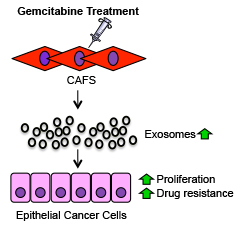Cancer-associated fibroblasts (CAFs) comprise the majority of the tumor bulk in pancreatic adenocarcinoma (PDAC). Current efforts to eradicate these tumors focus predominantly on targeting the proliferation of rapidly growing cancer epithelial cells. We know that this is largely ineffective with resistance arising in most tumors following exposure to chemotherapy. Despite the long-standing recognition of the prominence of CAFs in PDAC, the effect of chemotherapy on CAFs and how they may contribute to drug resistance in neighboring cancer cells is not well characterized.
 Our data show that CAFs are innately resistant to gemcitabine (GEM), the current standard-of-care for PDAC patients.Moreover, we have found that exosomes (secreted membrane vesicles that range in size from 40–100 nm in diameter) from CAFs exposed to GEM are critical regulators of epithelial cancer cell proliferation and survival.
Our data show that CAFs are innately resistant to gemcitabine (GEM), the current standard-of-care for PDAC patients.Moreover, we have found that exosomes (secreted membrane vesicles that range in size from 40–100 nm in diameter) from CAFs exposed to GEM are critical regulators of epithelial cancer cell proliferation and survival.
GEM-treated CAFs prolifically secrete exosomes that transfer chemoresistance-promoting factors like mRNA and microRNA to recipient epithelial cells. Most importantly, blocking exosome release suppressed the chemoresistance-promoting abilities of CAF cells. Collectively, these findings show the potential for exosome inhibitors as treatment options alongside chemotherapy for overcoming PDAC chemoresistance.
Related Publications
Richards K, Zeleniak A, Fishel M, Wu J, Littlepage L, and Hill R. Cancer-Associated Fibroblast Exosomes Regulate Survival and Proliferation of Pancreatic Cancer Cells. Oncogene 2017 Mar 30;36(13):1770-1778. doi: 10.1038/onc.2016.353. Epub 2016 Sep 26.
